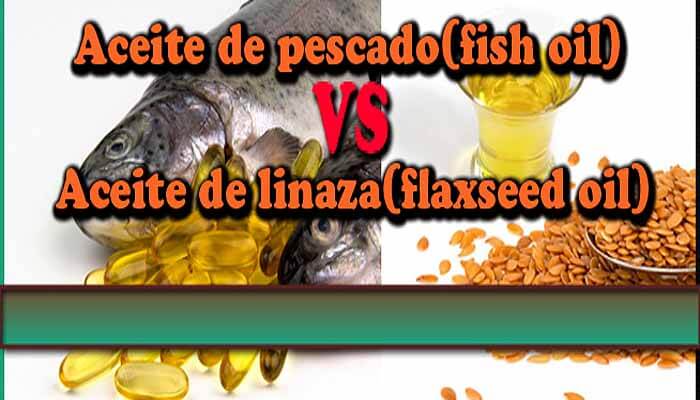Which of these two oils is the best option remains a question with no absolute answer, unless you are vegan. If so, then flaxseed oil is the final answer. Beyond that, they both have benefits, along with some potential issues to consider when choosing the right supplement. However, remember that it is always important to communicate with your doctor about the vitamins and supplements you are considering taking.
Let’s go on to see the pros and cons of fish oil and flaxseed oil to see who is the winner of these two.
The first thing to understand is that omega-3 fatty acids are actually divided into three separate components: ALA, EPA, and DHA.

Fish oil
fish oil contains omega-3 fatty acids, these fatty acids can be obtained by eating fish or taking fish oil supplements. Fish high in omega-3 fats are salmon, tuna, mackerel, anchovies, and sardines. According to MedlinePlus, supplements are generally made from mackerel, herring, tuna, halibut, salmon, cod liver, whale blubber or seal blubber. These supplements often contain vitamin E to prevent spoilage and can be combined with other vitamins and minerals. Fish oil supplements contain varying amounts of EPA and DHA.
Linseed oil
Flaxseed is a natural oil. It is commonly used to keep the whole body in a general sense of well-being. It is a rich natural source of Omega-3 fatty acids. Flaxseed oil provides the body with essential fatty acids that are necessary to maintain optimal health.
Flaxseed oil not only contains Omega-3, but also provides the body with essential fatty acids such as omega-6 and omega-9 (remember – omega 3 is good, omega 6 is bad, omega 9 is neutral). Although flaxseed oil is the richest source of ALA (alpha-linolenic acid), it does not contain EPA (eicosapentaenoic acid) and DHA. ALA can be converted in the body to the other omega-3 fatty acids, although conversion does not occur in a one-to-one ratio. According to an article published in the August 2012 issue of the journal “Applied Physiology, Nutrition and Metabolism,” about 5 percent of ALA is converted to EPA and less than 0.5 percent is converted to DHA. Therefore, a good source of EPA and DHA must be consumed to obtain essential fats in large quantities.
“The lack of conversion of ALA into EPA and DHA is due to inhibition of the competitive enzyme”. That is why we see such a minimal percentage …
Flaxseed oil also contains another essential fatty acid, linoleic acid, a omega-6 fatty acid.
General benefits of these two oils
linseed oil and fish oil provide essential fatty acids, which have been linked to reducing the risks of heart disease and stroke, lowering bad cholesterol levels, improving joint health, and reducing inflammation. While these benefits may not directly benefit the muscles, the knock-on effect is enormous. In order to perform and grow optimally, your muscles need the support of a healthy body, and both flaxseed oil and fish oil help improve your overall health.
The two most important omega-3 fatty acids in fighting disease and lowering cholesterol levels are EPA and DHA, fish oil has an abundance of these. Fish oil is the winner.
A study in the Clinical Journal of Sports Medicine found that subjects who consumed EPA and DHA fish oils suffered less soreness in the days following a workout than those who did not. fish oil is the winner.
Negative effects of these oils
The side effects of consuming fish oil include bad breath, heartburn, nausea, loose stools, and nosebleeds. Taking high doses of fish oil, more than three grams per day, can increase the risk of bleeding. High doses can also reduce the activity of immune systems. High-risk populations, such as HIV / AIDS or the elderly, should be wary of this. Flaxseed is possibly unsafe during pregnancy and can increase the risk of preterm labor if taken in the second and third trimesters. It can also increase bleeding. Be careful taking flaxseed oil with other medications, as they can slow down blood clotting.

Conclusion
So which is better? Hard to say, I think more discussion needs to be done on this. But by knowing the facts and the differences between the two you can make a better decision.
While both contain health-boosting properties, it appears that fish oil is superior in helping to build muscle thanks to EPA AND DHA.

